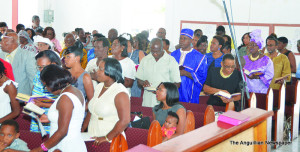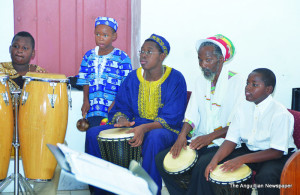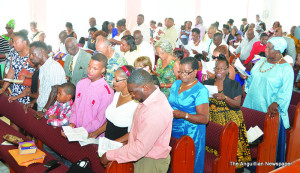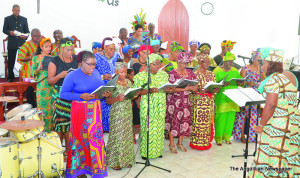
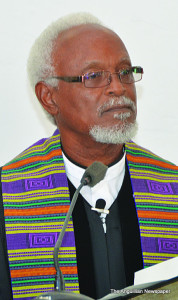
For the first time there has been a concerted effort in Anguilla to bring about an awareness of the relationship between August Monday as part of the holiday week of revelry, known as the Summer Festival, or Carnival, and Emancipation – the abolition of slavery in the British colonies, including Anguilla in 1834.
As Anguilla prepared for the main week of festivities and boat-racing, in celebration of forty years of carnival on the island, Sunday, August 3, was observed as Emancipation Sunday. Bethel Methodist Church, at South Hill, where the original church building was built by slaves, was the scene of a special service with reflections on the African slaves who were brought to the Caribbean and the degradation they suffered. The church’s senior choir set the tone for the order of service with several negro-spiritual songs; and Rev Dr Wycherley Gumbs mainly apportioned his sermon to slavery and emancipation as well.
Meanwhile, the three Anglican Churches had separate speakers who delivered appropriate Emancipation Sunday addresses to the congregations. They were Mr David Carty who spoke at St Mary’s Parish Church, The Valley; Mr Colville Petty, who was the speaker at St Andrew’s, Island Harbour; and Mr Marcel Fahie, who spoke at St Augustine’s, East End. Their addresses are printed elsewhere in this edition of The Anguillian as a public service.
During the Methodist Church service, a Pastoral Letter entitled Emancipation Our Unfinished Journey, written to the congregation by Rev Dr Gumbs, was read by one of the members. The letter stated in part: “Today, people of African heritage throughout the English-speaking Caribbean, commemorate the emancipation of our ancestors from three hundred years of slavery. From then to now, the realization of liberation from the structures which hindered us from controlling our destiny has been a chequered one. Positively, states and nations have emerged with their affairs mainly handled by our own people who were scarred by centuries of slavery and colonialism.
“We take pride in the symbols of sovereignty: national flags, anthems and songs, awards and the like. Negatively, in our passion for the proverbial ‘good life’, influenced by the mass media and the trappings of modernity, the foundations which kept us focused and confident have been shaken. These are: faith in God, the sacredness of the family bond, our individual and collective respect for each other and the community, and our belief in a common destiny.”
The Anguillian Methodist Circuit Superintendent Minister told the Bethel congregation members in his sermon that “despite the years of colonialism and slavery, we are the ancestors of a great heritage.” He urged them to “Look back and see what God has done in our history…how, after slavery, God raised up a people like you and me to stand tall and strong and say that God has been the God of our ancestors and is still our God.”
The message of slavery and emancipation is probably expected to feature more prominently in the Anguilla Summer Festival or Carnival next year, with themes of the centuries-old events manifesting in some of the cultural performances. At least one of the participating groups in last Friday’s Parade of Troupes carried a banner with the word “Emancipation” inscribed on it in bold and large letters.

